- Home
- Arthur Miller
The Penguin Arthur Miller Page 2
The Penguin Arthur Miller Read online
Page 2
—Arthur Miller, “Tragedy and the Common Man,” The New York Times, February 27, 1949
Like many outspoken artists and intellectuals during the 1950s, Miller found himself subpoenaed by HUAC. The committee questioned him, but unlike several of his close friends and collaborators he refused to give the names of alleged communists. It is not surprising that personal betrayals in life and love would thematically fuel Miller’s next cycle of plays. In A View from the Bridge, he again centered his drama around a flawed man, Eddie Carbone, whose integrity is called into question when he betrays members of his own close-knit community.
After A View from the Bridge it would be nearly a decade before Miller produced another successful play. In 1964, when he returned to the stage, he’d continue to experiment with form and content, writing powerful plays about imperfect men and embattled dreamers, including After the Fall, Incident at Vichy, The American Clock, Broken Glass, and The Price. Farther ahead in his career, Miller began to use more humor and satire to excoriate and question the selfishness of Americans toward the end of the twentieth century. His oft-overlooked later plays, The Ride Down Mt. Morgan, Mr. Peters’ Connections, and Resurrection Blues, maintain their political edge and revisit themes of his earlier work, investigating, as he says, the “immense contradictions of the human animal”; however, they are more wistful and open-ended.
As demonstrated in this extraordinary body of work, Miller invested in a theater of ideas but never allowed himself to be subjugated by commercial demands. At times he found himself in sync with the culture at large, and at other times, he battled against the prevailing winds. Ultimately, Miller’s plays have transcended time, not simply because they are beautifully crafted, but also because they are important social documents that capture moral conundrums that resonate powerfully for audiences today.
• • •
Miller’s career spanned seven decades, and he remained prolific to the end of his life. Even now, when I read plays in this collection, such as Death of a Salesman, The Crucible, A View from the Bridge, and Incident at Vichy, I can feel the urgency with which he pressed the pen to page and summoned up his characters from the margins.
Over the years there have been extensive scholarship and conjecture about the meaning of Miller’s work. But as a fellow playwright, I am a firm believer that his beautiful and timeless plays should speak for themselves. Part of the joy of having Miller’s plays in this one glorious collection is that it permits a new generation of theater makers and thinkers to delve into the major and minor works of one of America’s greatest writers and social critics. When viewed together his work forms a cohesive narrative of twentieth-century America, reflecting its contradictions and flaws. This collection reveals Miller’s fierce and uncompromising commitment to his ideals, to his notion that art should be in active conversation with the culture.
Each time I reach the end of The Crucible and read John Proctor’s final act of rebellion, I gasp not because I don’t know what is coming, but rather because I remain enthralled by the transcendent power of a few well-selected words on the page.
PROCTOR, with a cry of his whole soul: How may I live without my name? I have given you my soul; leave me my name!
I invite you, the next generation of theater makers, to dive into the collected plays of Arthur Miller. His work reminds us that theater should be a place of transformation, a place where we can collectively explore society’s wounds, unearth difficult truths, and wrestle with untidy human emotions.
Sincerely,
LYNN NOTTAGE
A Note on the Text
The texts printed in this volume are the versions preferred by Arthur Miller and should be considered authoritative texts.
THE MAN WHO HAD ALL THE LUCK
A FABLE
1944
Characters
DAVID BEEVES
SHORY
J.B. FELLER
ANDREW FALK
PATTERSON (PAT) BEEVES
AMOS BEEVES
HESTER FALK
DAN DIBBLE
GUSTAV EBERSON
AUGIE BELFAST
AUNT BELLE
SYNOPSIS OF SCENES
THE TIME Not so long ago.
Act One
SCENE I
An evening in early April.
Inside a barn used as a repair shop.
SCENE II
The barn, near dawn.
Act Two
SCENE I
June. About three years later.
The living room of the Falks’—now David’s—house.
SCENE II
Later that day. The living room.
Act Three
SCENE I
The following February. The living room.
SCENE II
One month later. The living room at evening.
ACT ONE
SCENE I
A barn in a small, midwestern town. It is set on a rake angle. The back wall of the barn sweeps toward upstage and right, and the big entrance doors are in this wall. Along the left wall a work bench on which auto tools lie along with some old parts and rags and general mechanic’s junk. A rack over the bench holds wrenches, screwdrivers, other tools. In the left wall is a normal-sized door leading into Shory’s Feed and Grain Store to which this barn is attached. A step-high ramp leads down from the threshold of this door into the barn. Further to the left, extending into the offstage area along the wall, are piles of cement bags. In front of them several new barrels that contain fertilizer.
Downstage, near the center, is a small wood stove, now glowing red. Over the bench is a hanging bulb. There is a big garage jack on the floor, several old nail barrels for chairs—two of them by the stove. A large drum of alcohol lies on blocks, downstage right. Near it are scattered a few gallon tins. This is an old barn being used partly as a storage place, and mainly as an auto repair shop. The timber supports have a warm, oak color, unstained. The colors of wood dominate the scene, and the gray of the cement bags.
Before the rise, two car horns, one of them the old-fashioned ga-goo-ga type of the old Ford, are heard honking impatiently. An instant of this and the curtain rises.
David Beeves is filling a can from an alcohol drum. He is twenty-two. He has the earnest manner of the young, small-town businessman until he forgets it, which is most of the time. Then he becomes what he is—wondrous, funny, naïve, and always searching. He wears a windbreaker.
Enter J.B. Feller from the right. He is a fat man near fifty, dressed for winter. A certain delicacy of feeling clings to his big face. He has a light way of walking despite his weight.
J.B.: Sure doing nice business on that alcohol, huh David? Thumbing right. They’re freezing out there, better step on it.
DAVID: Near every car in town’s been here today for some. April! What a laugh!
J.B., nods downstage: My store got so cold I had to close off the infant’s wear counter. I think I’ll get a revolving door for next winter. Sits. What you got your hair all slicked for?
DAVID, on one knee, examines the spigot which pours slowly: Going over to Hester’s in a while.
J.B.: Dave! Excitedly: Going alone?
DAVID: Hester’ll be here right away. I’m going to walk back to the house with her, and . . . well, I guess we’ll lay down the law to him. If he’s going to be my father-in-law I better start talking to him some time.
J.B., anxiously: The only thing is you want to watch your step with him.
DAVID, turns off spigot, lifts up can as he gets to his feet: I can’t believe that he’d actually start a battle with me. You think he would?
J.B.: Old man Falk is a very peculiar man, Dave.
Horns sound from the right.
DAVID, going right with the can: Coming, coming!
He goes out as from the back door, Shory descends the ramp in a fury. He is in a wheelchair
. He is thirty-eight but his age is hard to tell because of the absence of any hair on his body. He is totally bald, his beard does not grow, his eyebrows are gone. His face is capable of great laughter and terrible sneers. A dark green blanket covers his legs. He stops at the big doors with his fist in the air. As he speaks the horns stop.
SHORY: Goddamn you, shut those goddam horns! Can’t you wait a goddam minute?
J.B.: Lay off, will you? They’re his customers.
SHORY, turns: What’re you doing, living here?
J.B.: Why, got any objections? Goes to stove, clapping his arms. Jesus, how can he work in this place? You could hang meat in here. Warms his hands on the stove.
SHORY: You cold with all that fat on you?
J.B.: I don’t know why everybody thinks a fat man is always warm. There’s nerves in the fat too, y’know.
SHORY: Come into the store. It’s warmer. Shoot some pinochle. Starts toward the ramp to his store.
J.B.: Dave’s going over to see Falk.
Shory stops.
SHORY: Dave’s not going to Falk.
J.B.: He just told me.
SHORY, turns again: Listen. Since the day he walked into the store and asked me for a job he’s been planning on going to see Falk about Hester. That’s seven years of procrastination, and it ain’t going to end tonight. What is it with you lately? You hang around him like an old cow or something. What’d your wife throw you out of the house again?
J.B.: No, I don’t drink anymore, not any important drinking—really. He sits on a barrel. I keep thinking about those two kids. It’s so rare. Two people staying in love since they were children . . . that oughtn’t to be trifled with.
SHORY: Your wife did throw you out, didn’t she?
J.B.: No, but . . . we just got the last word: no kids.
SHORY, compassionately: That so, Doctor?
J.B.: Yeh, no kids. Too old. Big, nice store with thirty-one different departments. Beautiful house. No kids. Isn’t that something? You die, and they wipe your name off the mail box and . . . and that’s the ball game.
Slight pause.
Changing the subject; with some relish: I think I might be able to put Dave next to something very nice, Shor.
SHORY: You’re in your dotage, you know that? You’re getting a Santa Claus complex.
J.B.: No, he just reminds me of somebody. Myself, in fact. At his age I was in a roaring confusion. And him? He’s got his whole life laid out like a piece of linoleum. I don’t know why but sometimes I’m around him and it’s like watching one of them nice movies, where you know everything is going to turn out good. . . . Suddenly strikes him. I guess it’s because he’s so young . . . and I’m gettin’ so goddam old.
SHORY: What’s this you’re puttin’ him next to?
J.B.: My brother-in-law up in Burley; you know, Dan Dibble that’s got the mink ranch.
SHORY: Oh don’t bring him around, now . . .
J.B.: Listen, his car’s on the bum and he’s lookin’ for a mechanic. He’s a sucker for a mechanic!
SHORY: That hayseed couldn’t let go of a nickel if it was stuck up his . . .
Roar of engines starting close by outside. Enter David from the upstage door, putting a small wrench in his pocket. As he comes in two cars are heard pulling away. He goes to a can of gasoline and rinses his hands.
DAVID: Geez, you’d think people could tighten a fan belt. What time you got, John?
SHORY: Why, where you going? You can’t go into Falk’s house . . .
From the store enter Aunt Belle. She is carrying a wrapped shirt and a bag. She is a woman who was never young; skinny, bird-like, constantly sniveling. A kerchief grows out of her hand.
BELLE: I thought you were in the store. Hester said to hurry.
DAVID, going to her: Oh, thanks, Belle. Unwrapping a shirt. It’s the new one, isn’t it?
BELLE, horrified: Did you want the new one?
DAVID, looking at the shirt: Oh, Belle. When are you going to remember something! Hester told you to bring my new shirt!
BELLE, lifting them out of bag: Well I—I brought your galoshes.
DAVID: I don’t wear galoshes anymore, I wanted my new shirt! Belle, sometimes you . . .
Belle bursts into tears.
All right, all right, forget it.
BELLE: I only do my best, I’m not your mother . . .
DAVID, leading her right: I’m sorry, Aunt Belle, go—and thanks.
BELLE, still sniffling: Your father’s got your brother Amos out running on the road . . .
DAVID: Yeah, well . . . thanks . . .
BELLE, a kerchief at her nose: He makes Amos put on his galoshes, why doesn’t he give a thought to you?
DAVID, pats her hand: I’ll be home later.
SHORY: You know why you never remember anything, Belle? You blow your nose too much. The nose is connected with the brain and you’re blowin’ your brains out.
DAVID: Ah, cut it out, will ya?
With another sob, Belle rushes out.
She still treats me like after Mom died. Just like I was seven years old. David picks up the clean shirt.
SHORY, alarmed: Listen, that man’ll kill you. Grabs the shirt and sits on it.
DAVID, with an embarrassed but determined laugh, trying to grab the shirt back: Give me that. I decided to go see him, and I’m going to see him!
Enter Pat and Amos from right. Pat is a small, nervous man about forty-five, Amos is twenty-four, given to a drawl and a tendency to lumber when he walks.
PAT, on entering: What’s the matter with you?
David looks up. All turn to him as both come center. Amos is squeezing a rubber ball.
Pointing between David and stove: Don’t you know better than to stand so close to that stove? Heat is ruination to the arteries.
AMOS, eagerly: You goin’, Dave?
SHORY, to Pat: Everything was getting clear. Will you go home?
PAT: I’m his father, if you please.
SHORY: Then tell him what to do, father.
PAT: I’ll tell him. Turns to David as though to command. What exactly did you decide?
DAVID: We’re going to tell Mr. Andrew Falk we’re getting married.
PAT: Uh, huh. Good work.
SHORY: Good work! Pointing at Pat, he turns to J.B. Will you listen to this . . . !
J.B.—he shares Shory’s attitude toward Pat, but with more compassion: But somebody ought to go along with him.
PAT, adamantly to David: Definitely, somebody ought to go along . . .
AMOS, to David: Let me go. If he starts anything, I’ll . . .
DAVID, to all: Now look, for Christ’s sake, will you . . .
PAT, to David: I forbid you to curse. Close your collar, Amos. Of Amos to J.B.: Just ran two miles. He buttons another button on Amos, indicating Amos’s ball. How do you like the new method?
AMOS, holds up ball: Squeezin’ a rubber ball.
J.B.: What’s that, for his fingers, heh?
David examines his arm.
PAT: Fingers! That’s the old forearm. A pitcher can have everything, but without a forearm?—Zero!
SHORY, to Pat, of Dave: Are you going to settle this or is he going to get himself murdered in that house?
PAT: Who? What house? Recalling: Oh yes, Dave . . .
SHORY, to J.B.: Oh yes, Dave! To Pat: You’re his father, for G . . . !
DAVID: All right. I got enough advice. Hester’s coming here right away and we’re going over to the house and we’ll talk it out, and if . . .
SHORY: His brains are busted, how are you going to talk to him? He doesn’t like you, he doesn’t want you, he said he’d shoot you if you came onto his place. Now will you start from there and figure it out or you going to put it together in the hospital? Pause.
DAVID: What am I supposed to do then? Let him send her to that normal school? I might never see her again. I know how these things work.
SHORY: You don’t know how these things work. Two years I waited in there for a boy to ask for the job I put up in the window. I could’ve made a big stink about it. I was a veteran, people ought to explain to the kids why I looked like this. But I learned something across the sea. Never go lookin’ for trouble. I waited. And you came. Wait, Davey.
PAT: I’m inclined to agree with him, David.
DAVID: I’ve been waiting to marry Hester since we were babies. Sits on a barrel. God! How do you know when to wait and when to take things in your hand and make them happen?
SHORY: You can’t make anything happen any more than a jellyfish makes the tides, David.
DAVID: What do you say, John?
J.B.: I’d hate to see you battle old man Falk, but personally, Dave, I don’t believe in waiting too long. A man’s got to have faith, I think, and push right out into the current, and . . .
PAT, leans forward, pointing: Faith, David, is a great thing. Take me for instance. When I came back from the sea . . .
DAVID: What time you got, John . . . excuse me, Dad.
J.B.: Twenty to eight.
DAVID, to Shory: You giving me that shirt or must I push you off that chair?
PAT, continuing: I am speaking, David. When I came back from the sea . . .
SHORY, pointing at Amos: Before you come back from the sea, you’re going to kill him, running his ass off into the snow.
PAT: Kill him! Why it’s common knowledge that pacing is indispensable for the arches. After all, a pitcher can have everything, but if his arches are not perfect . . . ?
SHORY: Zero!
PAT: Before I forget, do you know if that alcohol can be used for rubbing? Indicates the drum.
DAVID: There’s only a couple of drops left.

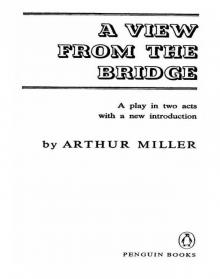 A View From the Bridge: A Play in Two Acts
A View From the Bridge: A Play in Two Acts Broken Glass
Broken Glass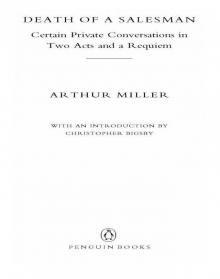 Death of a Salesman
Death of a Salesman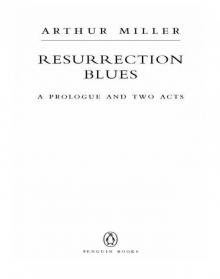 Resurrection Blues
Resurrection Blues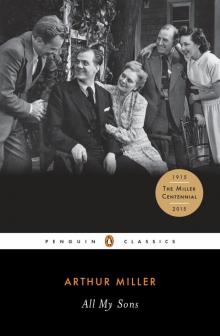 All My Sons
All My Sons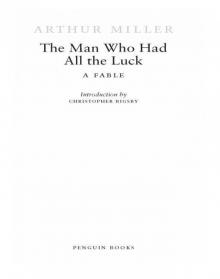 The Man Who Had All the Luck
The Man Who Had All the Luck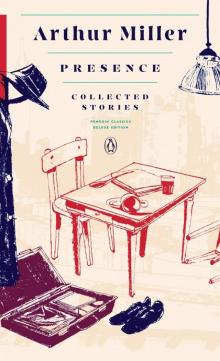 Presence: Stories
Presence: Stories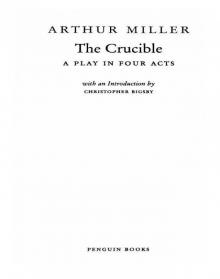 The Crucible
The Crucible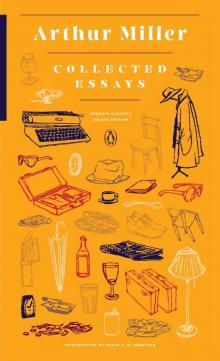 Collected Essays
Collected Essays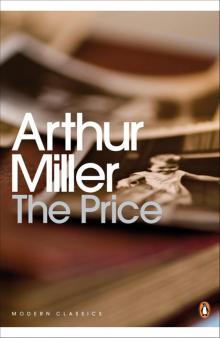 The Price
The Price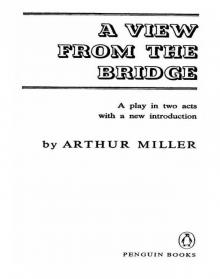 A View from the Bridge
A View from the Bridge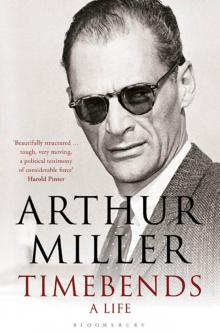 Timebends
Timebends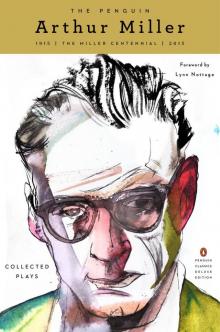 The Penguin Arthur Miller
The Penguin Arthur Miller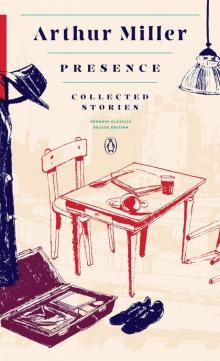 Presence
Presence